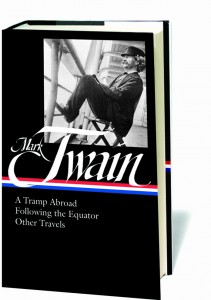World Books April Update
By Bill Marx
 I have neglected to point out the recent postings at my other gig, the online feature World Books at BBC/PRI’s The World. I just completed my April podcast, a departure for the series because I focus on a classic American author rather than a writer in translation.
I have neglected to point out the recent postings at my other gig, the online feature World Books at BBC/PRI’s The World. I just completed my April podcast, a departure for the series because I focus on a classic American author rather than a writer in translation.
But this April 21st marks the 100th anniversary of the death of Mark Twain, and the Library of America (one of my favorites, though the selection process for authorial inclusion has gone off-the-rails, with cult prose-slingers such as horrormeister H.P. Lovecraft making the cut), has put out two excellent volumes of writings by and about Twain that touch on his impact on the world, as well as his sometimes controversial views of other countries.
In the podcast I talk to Twain scholar and Stanford University professor Shelley Fisher Fishkin about Twain as an international figure; she edited Library of America’s excellent The Mark Twain Anthology: Great Writers on His Life and Work.
“A Tramp Abroad,” “Following the Equator,” and “Other Travels” complete the LoA’s Mark Twain Edition. I have poked around in the volume (edited by Roy Blount Jr.), and it contains plenty of fascinating material, from Twain’s challenging political views on international affairs, including genocide and class warfare (he always keeps one eye on America), to some sharply sardonic comic writing. While In Australia for “Following the Equator,” Twain describes what he calls “an imitation dude”:
Fellow of 30 with four valises; a slim creature, with teeth which made his mouth look like a neglected churchyard. He had solidified hair—solidified with pomatum; it was all one shell. He smoked the most extraordinary cigarettes—made of some kind of manure, apparently. These and his hair made him smell like the very nation. He had a low-cut vest on, which exposed a deal of frayed and broken and unclean shirt-front. Showy studs, of imitation gold—they had made black disks on the linen. Oversized sleeve buttons of imitation gold, the copper base showing through. Ponderous watch-chain of imitation gold. I judge that he couldn’t tell the time by it, for he asked Smythe what time it was, once. He wore a coat which had been gay when it was young; 5-o’clock-tea-trousers of a light tint, and marvelously soiled; yellow mustache with a dashing upward whirl at the ends; foxy shoes, imitation patent leather. He was a novelty— an imitation dude.
Love those “foxy shoes.” Fishkin suggests that the later travel writings will grow in importance, not only because Twain brought his democratic perspective to outposts of the British empire (New Zealand, India, South Africa) at crucial times, but his prose contains overlooked comic gems. The “imitation dude” could have been a passenger on the steamboat going down the Mississippi in Herman Melville’s The Confidence-Man. Fishkin’s volume features admiring observations of Twain from the usual suspects, but also includes surprising tributes from international figures, such as José Martí, Lu Xun, and Johnnes V. Jensen.
Other features on World Books include my interview with Tony Pipolo, author of the most comprehensive study in English on the films of French film director Robert Bresson. There’s also Anna Razumnaya’s scathing review of the posthumous publication of “The Original of Laura,” Vladimir Nabokov’s uncompleted, final novel. “The striking feature of Dmitri Nabokov’s edition of his father’s final unfinished novel,” she writes, “is the wresting of authorial control, by a son, from a man whose deep obsession with control was manifest throughout his literary career.”
Also check out an admiring review of “Ghosts at Home,” Marianne Hirsch and Leo Spitzer’s non-fiction study, “a stunning marriage of intellectual curiosity and personal search, a compelling historical reconstruction of the German-Jewish Central European culture of the embattled city of Czernowitz, once known as the “Vienna of the East.”
Also: A disappointed look at the latest novel from Nobel prize-winning writer Kenzaburō Ōe and an admiring notice of Canadian writer Lisa Moore’s novel February.
Tagged: A Tramp Abroad, Library-of-America, Mark Twain, Shelley Fisher Fishkin
